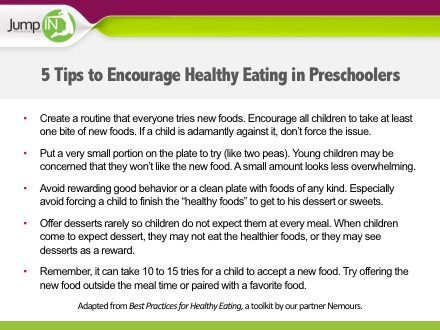Changes in Nutrition and Physical Activity for the Littlest Ones
Across central Indiana, child care providers of all shapes and sizes are making changes to improve the health of the children they serve. Some have dramatically changed their menus, adding whole grains, eliminating processed foods, and increasing fresh fruits and vegetables. Some have stopped using candy and sweets as rewards for desired behavior. Many have eliminated sugary beverages like lemonade and fruit juice. A few have started gardens and engage children in caring for the plants, picking and prepping the produce, and eating the fruits and vegetables.

These child care providers are making changes as a result of their participation in Taking Steps for Healthy Success, a training program launched in September 2013 by Nemours and Indiana Association for Child Care Resources & Referral (IACCRR, now Partnerships for Early Learners). More than 100 providers participated in the original study, receiving more than 50 hours of training and support to implement changes in nutrition and physical activity policies and procedures.
In 2015, Jump IN partnered with Nemours and IACCRR (now Partnerships for Early Learners) to train an additional 59 providers over the course of nine months with the goal of identifying the most efficient and cost effective methods for delivering training in best practices for healthy nutrition and physical activity. This study, set to be completed later this year with an evaluation by researchers at Ball State University, will help inform a sustainable and scalable training model to implement in child care providers across central Indiana and beyond. Jump IN and Partnerships for Early Learners have just started two more cohorts of child care providers participating in Taking Steps to Healthy Success, generously supported by Anthem.
In total, the Nemours, IACCRR/Partnerships for Early Learners and Jump IN collaboration has served more than 169 child care providers and impacted over 9,600 children in four years.
Research indicates that ages two to five are a critical time for instilling lifelong healthy behaviors, as children establish their eating habits by age five. Research Preschoolers who are overweight or obese are five times more likely to become overweight or obese as adults. Equally troubling, the prevalence of obesity among U.S. preschoolers has doubled in recent decades.

Training child care providers to create healthy environments for their students promotes the development of healthy habits during these critical years. In addition to the training, tools such as the Jump IN Pledge for Healthy Kids and our Resource Hub can help child care providers adopt healthy guidelines into their programs. Browse the Resource Hub for more ideas, information and inspiration.
Topics: Child Care, Healthy Eating
Subscribe for more
Want more ideas for healthy schools, workplaces, child care providers, and families? Subscribe to our blog for weekly tips delivered right to your inbox!
Making Healthier Food More Accessible NEXT »
Tips to Make Your Work Day Healthier
